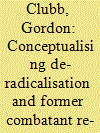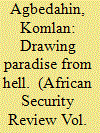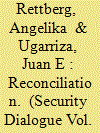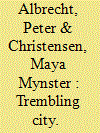|
|
|
Sort Order |
|
|
|
Items / Page
|
|
|
|
|
|
|
| Srl | Item |
| 1 |
ID:
163700


|
|
|
|
|
| Summary/Abstract |
Nigeria has recently joined the many states which have established de-radicalisation programmes. The article engages with debates on how the success of de-radicalisation can be ascertained given the substantial flaws of using individual-oriented recidivism rates as a measure. Many studies on de-radicalisation emphasise the need to consider the programme’s context to facilitate success, yet ‘context’ has been under-conceptualised and approached statically. The paper provides greater agency to ‘the context’ in distinguishing between the type of milieus former combatants are re-integrated into and how these emergent social relations shape the scope of de-radicalisation programmes, beyond the traditional over-emphasis on programme participant outcomes as measures of success. The Nigerian de-radicalisation programme has a broader function insofar as it provides former combatants with ‘scripts’ of disengagement and function as a brand, signalling to communities that former combatants have repented and are ‘better citizens, imbued with genuine nationalism’ that resonate with local communities.
|
|
|
|
|
|
|
|
|
|
|
|
|
|
|
|
| 2 |
ID:
165762


|
|
|
|
|
| Summary/Abstract |
This paper explores the nexus between child-soldiers’ wartime roles and their reintegration into the post-war society. Reintegration programmes do not suit all young veterans (former child soldiers). Many of these programmes do not result in their intended outcomes and literature has attempted to provide reasons for the failure or success of reintegration processes. The influence of young veterans’ war retentions, that is, skills, abilities, knowledge and practices gained through their wartime roles, on the reintegration process has not been adequately considered; this paper sets out to bridge this gap. The paper argues that wartime roles, far from being totally negative, could catalyse the reintegration process of some young veterans. While the paper partly concurs with the dominant apocalyptic description of the involvement of children in armed conflict, it argues that the experience gained from the war through combat, logistics, intelligence, reconnaissance and surveillance functions, is not always exclusively negative. Narratives collected from Liberian young veterans through in-depth interviews, attest to this. The paper also argues that the emphasis on the dominant role of killing and the harsh conditions of young veterans, tends to undermine any positive dimension of war retentions. The paper finally contests the view that there is diametrical opposition between wartime roles and post-war roles.
|
|
|
|
|
|
|
|
|
|
|
|
|
|
|
|
| 3 |
ID:
189028


|
|
|
|
|
| Summary/Abstract |
The limitations of conventional accounts of security and peacebuilding drawing upon the ‘expert’ knowledge of military elites, policymakers and civil society representatives have been widely recognized. This has led security and peacebuilding policymakers, including through the United Nations Women, Peace and Security agenda, to search for alternative forms of knowledge, such as memoirs, photographs or oral histories, that better reflect lived experiences within local communities. Building on existing work on memoirs as knowledge production artefacts and on feminist security studies, this article demystifies experiential security knowledge through an analysis of three memoirs written by women ex-combatants in Uganda. We argue that while the memoirs offer complex and contradictory narratives about women ex-combatants, they are also the products of transnational mediated processes, whereby the interests of power translate complex narratives into consolidated representations and sturdy tropes of the abducted African woman ex-combatant. This means that although the three memoirs provide some hints as to transformative ways of thinking about security and peace, and offer dynamic accounts of personal experiences, they also reflect the politics of dominant representational practices.
|
|
|
|
|
|
|
|
|
|
|
|
|
|
|
|
| 4 |
ID:
149482


|
|
|
|
|
| Summary/Abstract |
There appears to be a rift between the theoretical and normative understandings of what reconciliation means and offers, and what people expect to happen in postconflict scenarios. Here we present a conceptual framework that captures the definitional diversity surrounding the concept of reconciliation and then operationalizes it in order to analyze responses from postconflict populations. The illustrative application of our framework to responses from a representative survey of 1,843 Colombian citizens reveals that people’s convictions are just as diverse as scholars’. Nevertheless, significant proportions of respondents seem to understand reconciliation to be primarily a psychological and political process which aims to achieve the re-establishment of quotidian or day-to-day relations and cooperation; which should be preceded by the cessation of violence, dialogue, goodwill, and attitudinal and emotional change; and which should be accompanied by social welfare and security. It is noteworthy that understandings of reconciliation as a process mediated by justice, truth, and memory are scarce. The application of this framework will help to reveal differences between hopes and promises, and inform scholarly work and policymaking that is more realistically rooted.
|
|
|
|
|
|
|
|
|
|
|
|
|
|
|
|
| 5 |
ID:
188706


|
|
|
|
|
| Summary/Abstract |
While divided cities are characterized by spatially cemented segregation and polarized divisions, the trembling city is organized around transient and transformative borders. We conceptualize this notion of urban space to capture Freetown’s war-peace transition in the late 1990s and early 2000s. Ex-combatants settled on the city margins, bringing with them spatial strategies from war-fighting into the city by recreating a system of bases. The Sierra Leone Police (SLP) re-emerged with external support, seeking to compartmentalize and fixate Freetown through a combination of force and negotiation. We use borders and bordering to understand policing as attempts by both ex-combatants and the SLP to border in as well as out; defensively against external interference and offensively to make territorial claims. By extension, it is tensions in these practices between attempts to defend and harden borders, and at the same time, expand and soften them that trigger a tremble. The city tremble was a reminder of the possibility of war that Freetown very easily could return to. It also became a more general and inconspicuous condition of the city as an inhabited space, where multiple and often incompatible and conflictual spatial logics, strategies, and practices of policing clashed, overlapped and co-existed uneasily.
|
|
|
|
|
|
|
|
|
|
|
|
|
|
|
|
| 6 |
ID:
168800


|
|
|
|
|
| Summary/Abstract |
Recent research has shown that disarmament, demobilization, and reintegration (DDR) programs often fail to uproot wartime command structures. A key question is why some ex-commanders succeed in retaining control over their ex-fighters, while others are less successful. This study seeks to address this question by comparing four former midlevel commanders (ex-MiLCs) in Liberia and the ex-combatant networks that they head. Contrary to previous assumptions, which have stressed the tendency of ex-fighters to flock around ex-commanders operating in spaces of marginality, I argue that ex-MiLCs employed as government brokers and who funnel patronage from ruling elites to ex-combatants are likely to possess the most durable networks. These findings highlight how ex-military bonds thrive where previous research expects them to be weakest: close to government elites who are often designated as “agents of change” by international peacemakers.
|
|
|
|
|
|
|
|
|
|
|
|
|
|
|
|
| 7 |
ID:
161137


|
|
|
|
|
| Summary/Abstract |
This contribution suggests how to identify and deal with ex-combatants in (un)peaceful post-war environments from a methodological perspective. While it is obvious that large-N studies or standardized interviews fall too short to depict post-war dynamics and related conflict risks, ethnographic methods face numerous challenges, too. First, the identification of and access to former combatants may prove to be difficult. Often being stigmatized or perceived as outlaws they may not wish to get in touch with ‘outsiders’, like academics. Second, researchers need to be careful not to worsen the status of ex-combatants and at the same time make sure to maintain a trustful relationship with the rest of the community. Moreover, certain ethics apply when addressing sensitive war or contemporary issues (e.g. land grabs), even more, if there is a lack of amnesty. I aim at critically discussing questions of trust, legitimacy, networks, the necessity of ‘going local’, as well as logistics that can exacerbate dealing with ex-combatants or even pose a threat to researchers. Before concluding, I briefly delineate dilemmas related to the researcher’s role and her responsibility for field assistants. The article largely draws on my extensive ethnographic fieldwork experience in Cambodia and ethnographic literature on (post-)war settings.
|
|
|
|
|
|
|
|
|
|
|
|
|
|
|
|
|
|
|
|
|